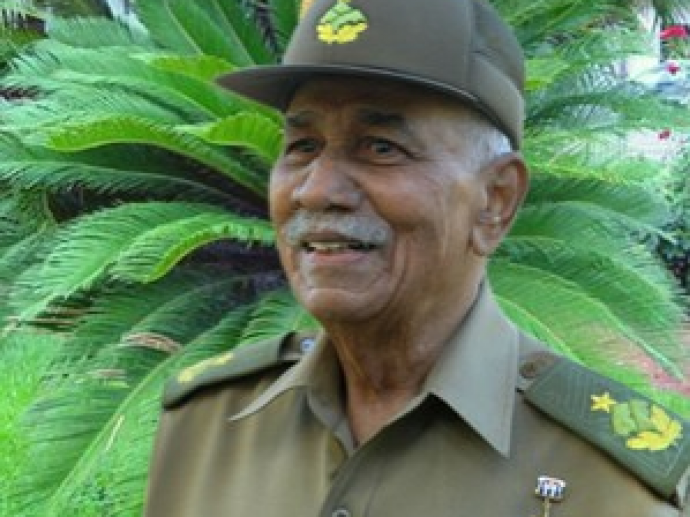
Much has been written about the Commander of the Revolution, Juan Almeida Bosque, about his courage, his conditions as a guerrilla leader, his unlimited fidelity to Fidel, about the composer, the man, but little has been said about his innate ability to identify with the humble people and, unintentionally, be his leader.
For many Cubans, it will be difficult to talk about Commander Almeida in the past tense. Such was his imprint on his long career, since he assaulted the Moncada barracks, along with the Centennial Generation until his death seven months after his 82nd birthday.
He was born in the capital's Poey Neighborhood on February 17, 1927, the son of a humble family, he had reached the eighth grade when he had to leave school to help support the family. She did any job, no matter how hard, to help her large family, her mother, her 11 siblings and her father, a modest journalist, whose salary was not enough to support her. and began to work in the field of construction in the University Spa.
His career after the victory is as commendable as it was since he met, at the beginning of 1953, the young Fidel Castro Ruz, in the spa of the University of Havana, where he worked as a ticket clerk, cleaning boy and bricklayer. After meeting Fidel and befriending him, Almeida was already in a clandestine cell with fellow bricklayer Armando Mestre, his neighbor and co-worker, with whom he traveled to Santiago de Cuba to assault the Moncada.
His affable character did not detract from his authority and, beyond his obligations; he found time to write songs, many of which were symbols of stages of the revolutionary process, such as the one dedicated to La Lupe, when he left Mexico for Cuba in Granma yacht.
Santiago will remember when Commander Almeida, in the first half of the 1970s, spent a few hours on Saturday nights, sitting in his jeep, alone with his driver, on the ground floor of the Casa Granda hotel, in front of Céspedes Park, to talk with those who came to greet him.
With the door open and sitting facing the street, they went on to show him the affection that he knew how to win in the more than five years of that decade in which he was Delegate of the Political Bureau of the Communist Party of Cuba in the former province of Oriente, together with Armando Hart Dávalos as First Secretary of the Provincial Committee of the Party.
Despite not being from Santiago, but from Havana, his humble origins as a builder and the frank and open treatment that characterized him, allowed him to quickly win the affection of the Orientals. The troops of the Mario Muñoz Third Front, of the Rebel Army, which he commanded, were the first to enter to liberate what was later recognized as Hero City.
The anecdote of the combat of Alegría de Pío, after the landing of the Granma, when the rebels were surprised by the forces of Batista's army, while resting for a while on the edge of a cane field, is known for his personal bravery.
In the midst of the fire against forces far superior in number, Almeida rescued Che, who was the expedition's doctor and was wounded in the neck. Hearing the shouts that ordered them to surrender, he yelled: "Nobody surrenders here, c...!", a phrase that went down in history as the island's virile response to every threat from the United States government.
After the 1st. January 1959, Commander Almeida became, from mid-June of that year, head of the Revolutionary Air Force, temporarily replacing the traitor Pedro Luis Díaz Lanz. On March 29, 1962, he participated as a member of the revolutionary court presided over by Commander Augusto Martínez Sánchez, to prosecute the participants in the mercenary invasion of Playa Girón, in April 1961. This court was also made up of Commanders Guillermo García Frias, Sergio del Valle and Manuel Piñeiro.
He assumed the leadership of the General Staff of the Rebel Army when Commander Camilo Cienfuegos physically disappeared, and later of the Central Army, of which he was the founder. He was deputy minister of the Revolutionary Armed Forces (FAR) and minister by statutory substitution for a short period; member of the Central Committee and the Political Bureau of the Communist Party of Cuba since its foundation in 1965, ratified in all the Congresses; delegate of this body in the East, later president of the Commission for Review and Control of the Central Committee; Vice President of the Council of State until his physical disappearance, and President, since 1993, of the Association of Combatants of the Cuban Revolution (ACRC).
For his many and relevant merits, he received multiple decorations and national and international orders, among which are the honorary title of Hero of the Republic of Cuba and the Máximo Gómez Order of the first degree, awarded on February 27, 1998, on the occasion of the anniversary 40 of his promotion to Commander in the Sierra Maestra.
Self-taught by vocation, Almeida was the author of a dozen books and won the Casa de las Américas award in 1985 for "Against the water and the wind", where he narrates the events after the passage of Cyclone Flora through the Island in October 1963 and the journey from Havana of a crew of helicopters rescuing people at the head of which he was traveling as Chief of the Cuban Air Force. His legacy goes beyond the revolutionary struggle. He accumulated a valuable and extensive artistic work, which includes the composition of more than 300 songs, many of which deeply penetrated popular preference.
On September 11, 2009, he died due to cardio-respiratory arrest and his mortal remains rest in the Mausoleum of the III Eastern Front, in the province of Santiago de Cuba, along with other combatants of the Cuban Revolution, where his people pay him permanent tribute.




